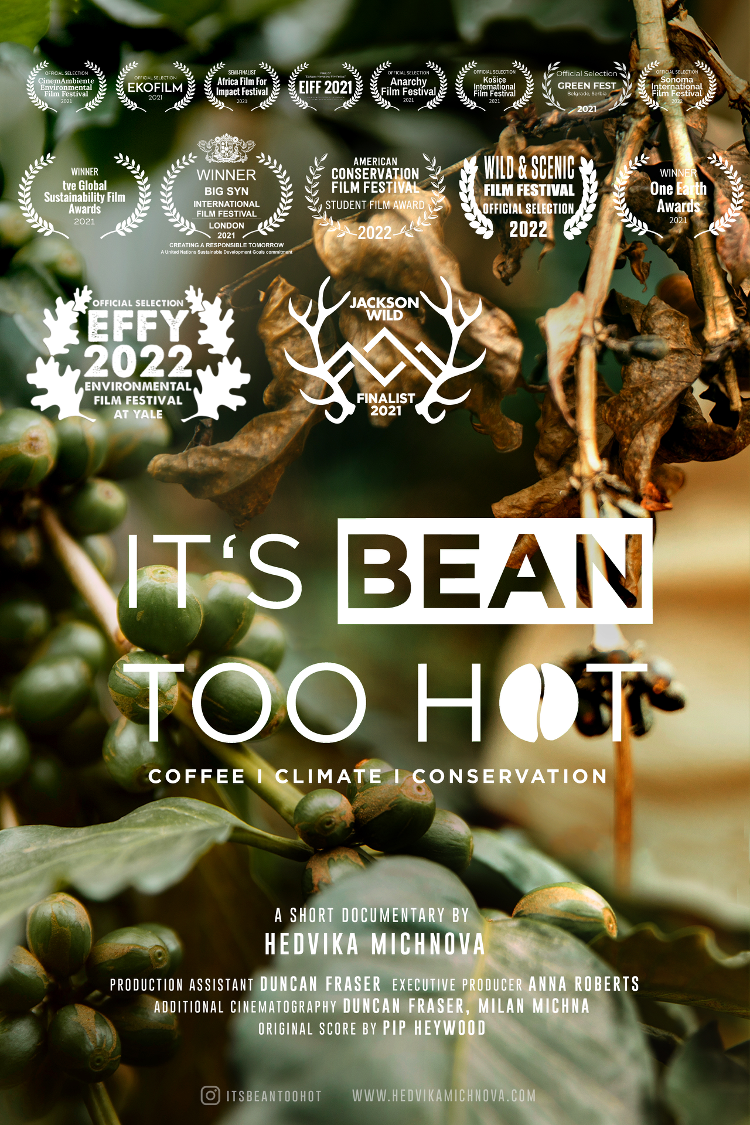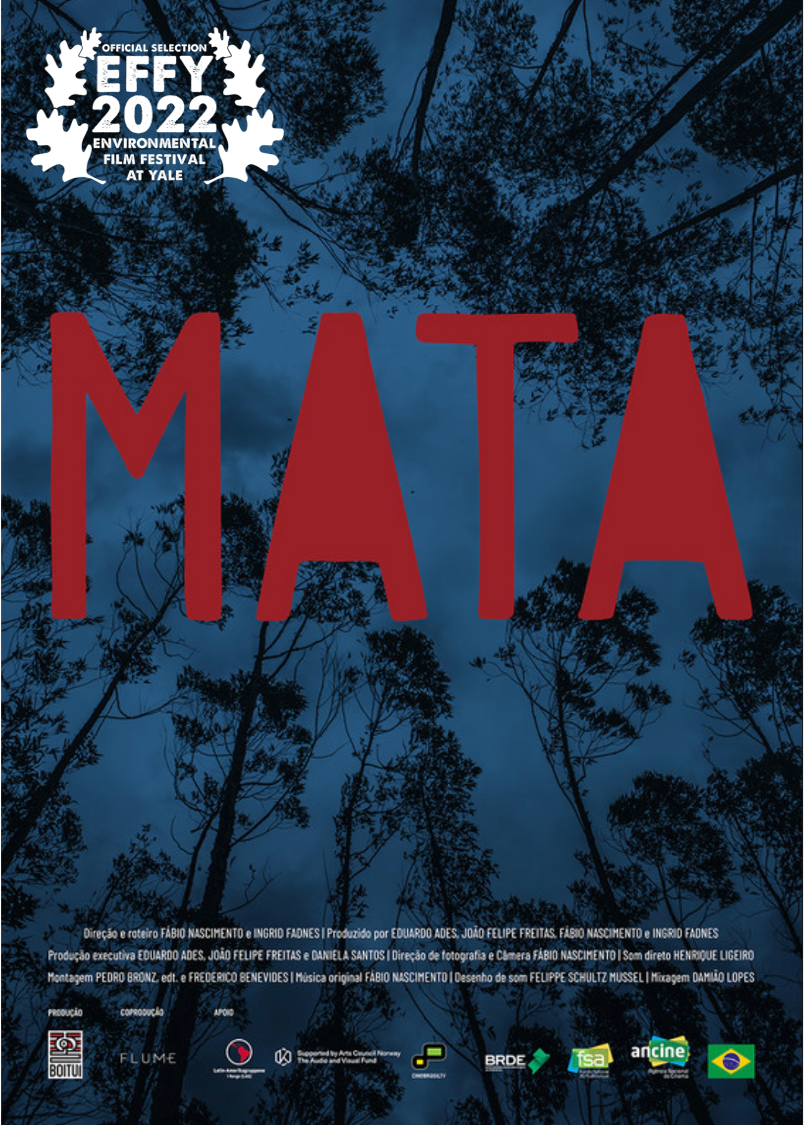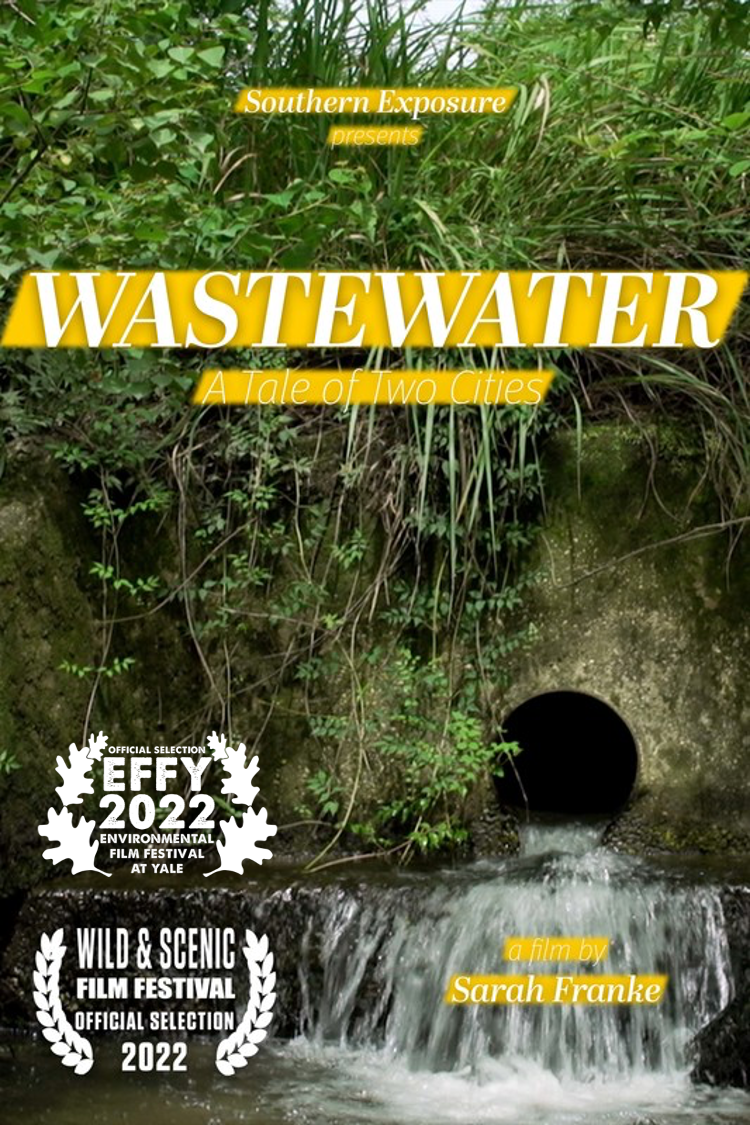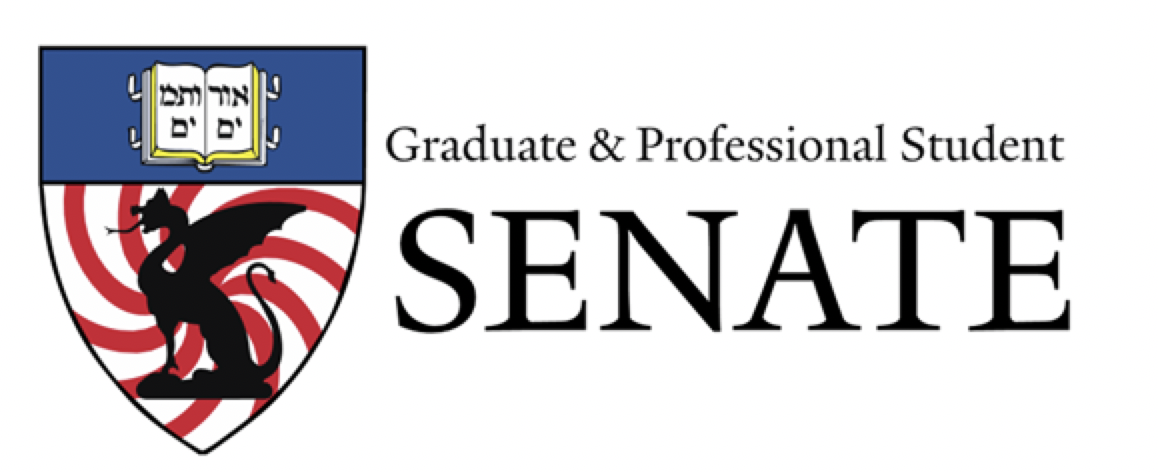THE EFFY 2022 LINEUP
Panel recordings are found directly below. Scroll down to read about this year’s lineup
DAY 1
THURSDAY, MARCH 31, 2022 - 4:45 - 9 PM - BURKE AUDITORIUM
Noticing Nature - Stories of Resilience in Unlikely Places
Register for Day 1 in-person screenings: HERE
Register to watch films and panels from home (online): HERE
As we continue to pave new roads, pour concrete, and seed our Kentucky bluegrass lawns, the boundary between the built environment and the natural world seems sharper by the day. The three films set to open EFFY 2022 explore this physical and psychological disconnect through stories of redemption and hope in our own backyards. By highlighting oft-overlooked urban and suburban ecosystems, these films challenge us to reconsider our relationship with—and responsibility towards—natural systems that are often closer to home than we realize.
WILD in the Garden State
What happens when typical suburban lawn is replaced with native plants? Shot over ten years on smartphones and a GoPro Camera, WILD in the Garden State documents gardening mis-steps, lessons and experiences that go far beyond replacing a rectangle of lawn. It’s a story of connecting to the natural world in suburban New Jersey.
American River
Mary Bruno spent her childhood along one of the most polluted waterways in America. Decades later, she returns to kayak the river of her youth and tell its story.
American River is a new 86-minute documentary film that follows Ms. Bruno and guide Carl Alderson on a 4-day, 80 mile adventure down the Passaic River, from its pristine source in a wildlife refuge to its toxic mouth in Newark Bay. The river’s amazing history, geology and ecology are revealed as the kayakers navigate challenges, travel through urban landscapes and head towards the industrial disaster that has poisoned the Passaic for the past 60 years
Broken Wings
Broken Wings is the story of a one-winged American black vulture named Adonis, and the two women in his life: Jayne, an Arkansas waitress who has fed him for 10 years, and Ann, her 80-year-old British roommate. Can a bird who devours the dead inspire the living?
DAY 2 - TWO SCREENINGS
FRIDAY, APRIL 1, 2022 - 12 pm - 4 pm - HQ L02 at 320 York Street
Roots Rising: Land, Food, and Power in the Sustainable Agriculture Movement
Register for Day 2 Matinee in-person screenings: HERE
Register to watch films and panels from home (online): HERE
As climate change threatens agriculture as we know it and the global population continues to rise, there is an increasing need to implement sustainable agricultural practices. At the same time, the more we grow, the more that this taking of land threatens indigenous peoples and the very health of the land itself. How can we navigate these interwoven issues of food security, sustainable agriculture, environmental wellbeing, and indigenous land rights?
Roots Rising presents three films depicting three angles of agriculture: the deleterious effects of climate change on crops such as coffee, an innovative approach to sustainable seafood, and the harms that Eucalyptus farming has on the land and wellbeing of indigenous peoples in Brazil. Join us for a conversation about how these complex issues are intertwined, and how we can grow food that sustains not only the planet, but its people.
It’s Bean Too Hot
Can you imagine our world without coffee? It’s a very real possibility. It’s Bean Too Hot tells the story of the coffee heroes – small farmers in Costa Rica and Tanzania who are fighting climate change every day to save their livelihoods and your daily cup of coffee.
The Ocean Solution
Farming under the sea? Meet Bren Smith, the ocean farming pioneer whose vertical kelp and shellfish farms can transform the way food is produced. As a commercial fisherman, Bren’s career was nearly wrecked by the crashing cod stocks in the North Atlantic; he then turned to oyster farming, just in time for catastrophic, climate-driven storms to show him there wasn’t a solid future in that, either. Unwilling to tether himself to land, he took the hard lessons learned and returned to the sea with a new method of restorative ocean farming. What he discovered is a way to produce large quantities of nutritious food that also fights the climate crisis, cleans the ocean, creates aquatic habitat and sustains his sea-going way of life.
MATA
Towards the expansion of the eucalyptus plantations, a farmer and an indigenous leader stand as resistance and reveal the impact of monoculture on the environment and traditional ways of life. The enemy can also be green.
FRIDAY, APRIL 1, 2022 - 6 -10 PM - Now At: HQ L02 AT 320 YORK STREET
Coming Together: Citizen Activists and Communities Working for the Planet
Register for Day 2 Evening in-person screenings: HERE
Register to watch films and panels from home (online): HERE
In a world of challenging environmental problems, communities and local residents create solutions. People acting in solidarity to create political change, protect ecosystems, and to help endangered species survive are inspiring examples of what can be accomplished when we take conservation into our own hands. This panel features community leaders, activists, and professionals speaking about their unique campaigns for regeneration, preservation, and positive change.
The Island Naturalist
The Island Naturalist is a film which explores a conservation photographer’s unique relationship with nature, revealing hidden stories on the Caribbean islands. For most of us, the Caribbean is a vacation spot known for its white sand beaches and azure-colored waters, but for Eladio Fernandez, islands are hots spots for biodiversity and a lot of it remains undocumented. These islands, and the natural wealth they hold, are in a race against time. Overpopulation, deforestation, mining, poverty and corrupt governments threaten with extinction many of the same species that this island naturalist is fighting to preserve.
Obsessed by his quest to document and save nature, Eladio takes us on a tour of one of the most important humpback whale calving-grounds, the discovery of a new pornographic flower, the conservation of a critically endangered bird, and the re-discovery a long-lost Magnolia in Haiti.
Pantanal - A Charred Wetland
Located in the heart of Brazil, the Pantanal is a tropical wetland packed with the most remarkable wildlife. It has a global importance due to its characteristic water cycle and annual floods, which are essential to maintain a huge diversity of unique species. However, due to human actions, the floods are now becoming smaller and rivers are drying out, which is causing severe droughts. The consequences of this became evident in 2020, when huge wildfires destroyed over a quarter of this biome, killing millions of animals along the way. Two brave locals – Eduarda and Jorge – decided to give their all to rescue and save the lives of severely injured animals along the way.
Shawnee Showdown: Keep the Forest Standing
During the late 1980s and 1990s, a small, dedicated group of activists fought on the ground and in the courts to stop clear-cutting, oil and gas drilling, and ATV use in the Shawnee National Forest located in Southern Illinois. They won the support of their community and the struggle in a landmark court case. Seventeen years later, the court lifted the injunction, and the Forest Service resumed logging.
Shawnee Showdown: Keep the Forest Standing portrays the struggle to protect the forest through interviews, photographs, and news footage. The film examines the ways the past struggle can serve to inform the public and activists today in responding to current Forest Service management projects.
Rebirth of a Reef
The rocky reefs that are home to countless species of fish and invertebrates and support the giant kelp forests of the Palos Verdes Peninsula (California) are under threat. They’ve historically been ravaged by landslides, burying the rocky structure and killing plant and animal life on the reefs. Fortunately, there’s a team of scientists at the Vantuna Research Group and NOAA who are working to bring these beautiful reefs back to Palos Verdes. Join us as we watch the team put their decades of research to use, creating a new system of reefs and restoring the underwater world of Palos Verdes.
DAY 3
SATURDAY, APRIL 2, 2022 - 3 pm - 6 pm - burke auditorium
The Davids and Goliaths of Environmental Justice Movements Around the World
Register for Day 3 in-person screenings: HERE
Register to watch films and panels from home (online): HERE
This panel focuses on stories from across the world of inspiring local, tribal, and native people empowering themselves in diverse ways and rising against oppressive institutions—be it the international order, local authorities promoting racism, or the environmentally-unjust tourism industry.
Return Saysk to the Sea
Bizarre Soviet irrigation experiments in Southern Ukraine, created a slow eco-disaster which continues today. The Sasyk Estuary, by the Black Sea, is ground zero for a battle between eco activists vs. poachers, bureaucrats and corrupt officials.
Wastewater: A Tale of Two Cities
The other tale of two cities - both plagued by decades of lack of investment and racial discrimination in their wastewater infrastructure and facing further challenges amidst climate change - told by community members, advocates, utility operators, and elected officials. As the nation grapples with how to fund long overdue infrastructure needs, this film brings to light the need for urgency and equity in these decisions.
Finding Palemahan
Finding Palemahan tells the story of Darmawan, a Balinese man who found a solution to plastic pollution by uniting his community behind an ancient philosophy: Tri Hita Karana. While the Balinese traditional practices cultivate a harmonious relationship with nature, modern development has brought a new material - plastic. In rural areas, plastic continues to be burned and thrown into the ocean. Darmawan intends to preserve the cultural value of living in harmony in the wake of waste.
Antonese
As a waitress at a local tourist resort on Cat Island, Antonese Anthon tells guests every day how to access a nearby beach that is one of the most beautiful in all The Bahamas. Yet, she has never been herself. This is not an uncommon scenario for many Bahamians—that a history of colonialism, servitude, and the transatlantic slave trade has created barriers to their most accessible resource, the ocean. With the support of Young Marine Explorers, a Bahamian-led nonprofit working to ensure that all members of the community have the tools needed to protect the ocean, Antonese embarks on a transformational journey into her past and into the water.
PANEL DISCUSSIONS
DAY 1
THURSDAY, MARCH 31, 2022 - 8 - 9 PM - BURKE AUDITORIUM - 195 PROSPECT STREET (and virtual)
Noticing Nature - Stories of Resilience in Unlikely Places
Panelists
Sarah Galloway and Dave Comins
WILD in the Garden State
Sarah and her husband Dave move from an apartment in New York City to a house in New Jersey complete with a white picket fence and a 130-foot span of lawn. From her work as a video producer for the American Museum of Natural History in New York, Sarah is familiar with the environmental threats from typical lawn care services. Dave is an Architect and hopes to transform their lawn into a beautiful, park-like space.
The city transplants both want a beautiful, eco-friendly garden, but have little gardening experience. To get started they mail-order a pre-planned, native pollinator garden. When a monarch finds the new native plant bed it feels like a miracle. Encouraged, the couple continue to transform their lawn into a beautiful, life-sustaining habitat.
Scott Morris
American River
Scott Morris is an accomplished independent filmmaker with more than 40 years of experience producing, directing and editing documentaries in the New York/New Jersey area. His work includes award-winning one-hour films including SAVING THE GREAT SWAMP: BATTLE TO DEFEAT THE JETPORT currently distributed by American Public Television, and FROM THE ASHES: THE LIFE AND TIMES OF TICK HALL featuring talk-show host Dick Cavett and premiering at the 2001 Hamptons Film Festival.
Scott’s early career includes exploration of many genres including animation and dramatic short subjects. In the 1970s, he received grants from the National Endowment for the Arts and New York State Council on the Arts to produce a series of films about New York City street festivals broadcast on HBO and shown at the Museum of Modern Art.
As a film editor, Scott cut an Academy Award-winning short and Emmy award-winning long-form documentaries for Discovery, PBS and network television. Throughout his career, he produced dozens of films for non-profit organizations and corporations while raising a family in New York and New Jersey.
DAY 2
FRIDAY, APRIL 1, 2022 - 3 pm-4 pm - HQ L02 at 320 York Street (and virtual)
Roots Rising: Land, Food, and Power in the Sustainable Agriculture Movement
Hedvika Michnova
It’s Bean Too Hot
Hedvika Michnova is a filmmaker and photographer from the Czech Republic, currently living in Bristol UK. As a recent graduate of Marine and Natural History Photography, she has completed a short-film "It's Bean Too Hot" about the effects of climate change on coffee production. She is passionate about telling stories about the natural world and communicating important issues to the audience.
.
Fábio Nascimento and Ingrid Fadnes
MATA
Fábio Nascimento is a documentary photographer and filmmaker who has worked for National Geographic, Greenpeace, Doctors without Borders, The New York Times, producing stories about people, nature and science. Brazilian, where he studied journalism, and subsequently film theory at the Sorbonne Nouvelle, and a Master degree in documentary film at Paris VIII, France. In addition to directing documentaries, he is also a photographer and editor, has also a background in music and, as a result, composes the soundtracks for many of his films. In recent years, he has divided his time between projects ranging from tropical forests to the poles, working on all continents and embarking on ships across the globe.
Ingrid Fadnes is a journalist and researcher. For more than a decade she worked in between Central America and Brazil with social and political issues related to indigenous and rural movements. She is a radio documentarist and MATA is her first film.
DAY 2
FRIDAY, APRIL 1, 2022 - 9-10 PM - (virtual)
Coming Together: Citizen Activists and Communities Working for the Planet
Eladio Fernandez
The Island Naturalist
Eladio is a naturalist, a conservation photographer, a documentary filmmaker, and a scientific researcher based in the Dominican Republic with a specialty in Caribbean subjects, both land and underwater. Eladio considers his camera is a tool for science and conservation.
He has one of the most extensive image banks on the landscapes, flora and fauna of the Greater Antilles. Since 2007, he has produced a series of photography books with funding from local and international corporate sponsors. Among his titles in print are: “Hispaniola: A Photographic Journey Through Island Biodiversity” (Grupo SID/Harvard University Press, 2007) with a foreword by E. O. Wilson. Eladio is a co-author of the field guide “Birds of the Dominican Republic and Haití” (Princeton University Press, 2006) and has collaborated in the description of new reptiles, plants, and has co-authored several scientific publications.
Along with 4 colleagues from Harvard University, Eladio published "Studies in Aristolochia (Aristolochiaceae) of Hispaniola" (Phytotaxa 2019), an article describing 3 new species of Dutchman's pipe plants. A subsequent publication is in the works that will add 12 new species.
He serves on the boards of Fundación Progressio, Fondo Peregrino RD and iLCP. He is also an environmental advisor for Fundacion Propagas
Freddy Ginebra
The Island Naturalist
Freddy is a musician at heart, having graduated from the Musician's Institute (Los Angeles, California) and the University of Miami. He went from music to advertising and from advertising to movies. In 2016 he produced his first local piece, the music for the film “Carpinteros” (the first Dominican film to participate in the Sundance Festival). Since 2014 he has been a professor at the School of Advertising and Communication at UNIBE, and in 2017 his incredible students selected him as one of the 35 most influential professors at the 35th anniversary of the University.
Currently, he is a strategist and creative director at the advertising agency Cumbre Saatchi & Saatchi, organizer of TEDx SantoDomingo since 2009, and co-director of the documentary "El Naturalista Isleño".
Laura Pennafort
Pantanal - A Charred Wetland
Laura is a biologist and wildlife filmmaker, born in Brazil and now based in the UK where she has been establishing her career in natural history documentaries. Her main goal as a filmmaker is to raise awareness about environmental issues, climate change and animal wellbeing through her documentaries, as well as highlighting the positive efforts people have had to protect our beautiful planet.
Cade Bursell
Shawnee Showdown
Cade is a lover of the earth, interdisciplinary researcher, activist, eco-artist, and media maker. She lives with her wife on land that borders the Shawnee National Forest. The climate crisis and the mass extinction of species impact her current work in activism and art. Her films have been exhibited internationally at film festivals, universities, and micro cinemas. She is a Professor in the Department of Cinema in the School of Media Arts at Southern Illinois University, Carbondale, and is active in several community-based projects.
DAY 3
SATURDAY, APRIL 2, 2022 - 5-6 pm - BURKE AUDITORIUM - 195 PROSPECT STREET
The Davids and Goliaths of Environmental Justice Movements Around the World
Andrea Odezynska
Return Sasyk To The Sea
Andrea Odezynska is a Ukrainian American independent filmmaker. She has created narrative, documentary, and experimental films. Variety has praised her work's “beautiful, iconic images.”
Recently, Andrea won a U.S. Fulbright Scholar grant to research and film her new environmental feature documentary, “Return Sasyk To The Sea”, in Ukraine. Past grants include: NEA The National Endowment for the Arts, NYSCA The New York State Council on the Arts, and the Robert Wise Foundation. Festivals include: The Hamptons Film Festival, Rotterdam, Kansas City Kansas (sidebar films about motherhood), Through Women’s Eyes International Film Festival in Sarasota, Florida, The Princeton Environmental Film Festival, The Rural Route Film Festival, Craft In Focus Festival in Amsterdam, Holland, and many more.
Sarah Franke
Wastewater: A Tale of Two Cities
Sarah Franke is a Chicago-based filmmaker and photographer. She is interested in delving into the complex relationships that exist between humans and their environment, and employing honest storytelling to explore the ethos of people and places. Drawn to stories with environmental or social impact, she aims to produce work that can engage, inform and resonate with diverse audiences.
The Environmental Film Festival at Yale (EFFY), hosted by the Yale School of the Environment at Yale University, is one of America's premier student-run environmental film festivals. Every spring, EFFY showcases incisive, cutting-edge films that highlight the environmental and social issues of our time. For each screening there will be a panel discussion centered on one or more of the films of that day.







































